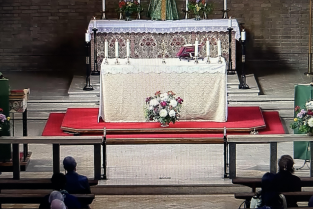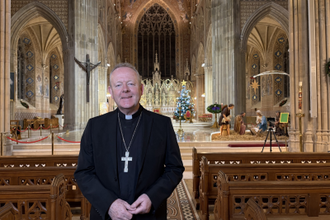Bishop Davies: Pro-life movement must prepare for long 'spiritual battle'

Heidi Crowter - Wiki Image
Source: Shrewsbury Diocese
The pro-life movement must be prepared for a protracted struggle in 21st Century, the Bishop of Shrewsbury has said.
In a homily at a Mass for the National Pro-Life Pilgrimage to Walsingham, Norfolk, the Rt Rev Mark Davies said that the relentless advance of the "culture of death" meant the movement must be ready to respond to many new challenges in the years ahead.
They would include "repeated assaults on both the laws and the social environments of care, which have long protected and cherished the lives of society's weakest members", the Bishop said.
Yet he assured pilgrims that the pro-life movement would stand as one of the noblest movements in human history and would emerge victorious even if for long periods it appeared beleaguered.
Bishop Davies told them that "beneath the surface of events we glimpse how the struggle to hold human life sacred is a spiritual battle, part of the dramatic struggle which the Second Vatican Council declared will continue until the end of time".
He noted that in the past, instead of the swift reversal of the 1967 Abortion Act, which was anticipated when it became apparent that it had opened the door for "the killing of the unborn on an industrial scale", the pro-life movement found itself battling against further excesses, such as the abortion of disabled babies up to the point of birth.
At the present moment, he said at the Mass on October 23, the voices of such activists as Heidi Crowter, who has Down's syndrome, are practically ignored while there is also a real danger of assisted suicide becoming law.
Such pressure was being exerted, Bishop Davies said, even in the face of abundant and deeply disturbing evidence of the expansion of the eligibility of criteria in every jurisdiction which has legalised either assisted suicide or euthanasia - including to children and the mentally ill in countries like Belgium and the Netherlands.
Bishop Davies encouraged the pilgrims, however, to see such encroachments as opportunities to preach joyfully the "Gospel of Life", proclaimed so emphatically by Pope St John Paul II throughout his ministry, and encouraged pilgrims to persevere confident in the ultimate and "total victory of life".
Bishop Davies said: "The pro-life movement will surely stand as one of the noblest movements in human history and its victory is ultimately assured.
Yet, the path to that victory of life over death, at times faces many contradictions. How are we to understand that in Britain today, a society that mobilised itself in a pandemic, making many sacrifices to protect the lives of the vulnerable, is now considering assisting the suicide of some the most vulnerable members of society? Dismayed by such contradictions, we must never lose the joy and hope that is the hallmark of the cause of life.
"I recall almost half a century ago, the founders of the pro-life movement tirelessly travelling to meetings across this land, communicating how the cause of life is the most positive of all causes. If we were confident at the time, that a "culture of death" would be quickly overcome; that public opinion would never long tolerate the killing of the unborn on an industrial scale; if we thought that rational argument must surely prevail; and that to move consciences it would be sufficient to expose the cruel reality of abortion, we soon came to see how a culture of death advances remorselessly, precisely by dulling human consciences. A process where it becomes possible to propose that pre-born children with disabilities be killed up to the point of birth.
"We recently heard the brave voice of Heidi Crowter, a woman with Down's syndrome, say, 'The law does not respect my life.' Remarkably, this cry barely elicited a moment of public concern. Meanwhile, the euthanasia lobby which has campaigned since the 1930s - a time when unspeakable crimes were being committed in the name of eugenics - brings forward Bill after Bill to break the legal protections surrounding the care of the sick and the dying. It advocates opening the way for assisted suicide theoretically, in carefully regulated cases. Yet, experience in other jurisdictions shows that in practice this culture of assisted suicide extends rapidly to include those with mental illnesses and even young children.
"In this century we can expect a protracted struggle and we must be ready for repeated assaults on both the laws and the social environments of care, which have long protected and cherished the lives of our society's weakest members. Yet, this struggle is the opportunity to give witness to the value of every human life and to announce once more the Gospel of Life with joy."
LINKS
Diocese of Shrewsbury: www.dioceseofshrewsbury.org
Joint statement from faith leaders about the Assisted Dying Bill: www.cbcew.org.uk/faith-leaders-joint-statement-on-the-assisted-dying-bill/
Homily in full:
Homily of Rt. Rev. Mark Davies, Bishop of Shrewsbury For the Pro-Life Pilgrimage to Walsingham, 23rd October 2021
The great Pope, and indeed the great Saint, who led the Church into this new millennium, foresaw a struggle of apocalyptic proportions to uphold the sanctity of human life. Saint John Paul II helped us see that every rejection of human life "is really a rejection of Christ" Himself (i) and to recognise in Mary's Motherhood "... the incomparable model of how life should be welcomed and cared for" (ii) He often recalled the words of the same Jesus who said, "Whoever receives a little child in my name receives me"; (iii) and "Whatever you did to the least of my brothers and sisters, you did to me". (iv) In this way, Pope Saint John Paul wanted us to see how every life threatened is a life united by the Incarnation to that of the Son of God Himself. (v) In today's proliferating attacks on the lives of those most vulnerable, we are witnessing nothing less than a rejection of God-made-man.
The Book of Revelation describes how monstrous evil pursues and seeks to devour the Child born of the Blessed Mother. This attack is perpetuated today in everything that rejects and destroys human life from its beginning. This is the dramatic perspective in which we gather in Walsingham today. Walsingham established almost a millennium ago, so that "... the great joy of the Annunciation" - that is, the Mystery of the Incarnation, might never fade from the memory of people of this land. (vi) As we ask for courage to proclaim the Gospel of Life in post- pandemic Britain, let us also ask to share its joy.
The Pro-Life movement will surely stand as one of the noblest movements in human history and its victory is ultimately assured. Yet, the path to that victory of life over death, at times faces many contradictions. How are we to understand that in Britain today, a society that mobilised itself in a pandemic, making many sacrifices to protect the lives of the vulnerable, is now considering assisting the suicide of some the most vulnerable members of society? Dismayed by such contradictions, we must never lose the joy and hope that is the hallmark of the cause of life.
I recall almost half a century ago, the founders of the pro-life movement tirelessly travelling to meetings across this land, communicating how the cause of life is the most positive of all causes. If we were confident at the time, that a "culture of death" would be quickly overcome; that public opinion would never long tolerate the killing of the unborn on an industrial scale; if we thought that rational argument must surely prevail; and that to move consciences it would be sufficient to expose the cruel reality of abortion, we soon came to see how a culture of death advances remorselessly, precisely by dulling human consciences. A process where it becomes possible to propose that pre-born children with disabilities be killed up to the point of birth. We recently heard the brave voice of Heidi Crowter, a woman with Down's syndrome, say, "The law does not respect my life." Remarkably, this cry barely elicited a moment of public concern. Meanwhile, the euthanasia lobby which has campaigned since the 1930s - a time when unspeakable crimes were being committed in the name of eugenics - brings forward Bill after Bill to break the legal protections surrounding the care of the sick and the dying. It advocates opening the way for assisted suicide theoretically, in carefully regulated cases. Yet, experience in other jurisdictions shows that in practice this culture of assisted suicide extends rapidly to include those with mental illnesses and even young children.
In this century we can expect a protracted struggle and we must be ready for repeated assaults on both the laws and the social environments of care, which have long protected and cherished the lives of our society's weakest members. Yet, this struggle is the opportunity to give witness to the value of every human life and to announce once more the Gospel of Life with joy.
In the Book of Revelation, we hear how a loud voice declares from the throne of God "Death shall be no more ...!". (vii) This is the promise that every fearful manifestation of evil which threatens to overwhelm humanity and thwart God's purpose, will finally be dispelled by the total victory of life. For beneath the surface of events we glimpse how the struggle to hold human life sacred is a spiritual battle, part of the dramatic struggle which the Second Vatican Council declared will continue until the end of time. (viii)
The same Council of the Church pointed to the Mother of God as "the great sign" (ix) and the assurance of the victory which already shines out.(x) Today in Walsingham, we turn our gaze to Blessed Mary as the "... Mother of the living" and entrust the cause of life to her anew. (xi)
i Evangelium Vitae No. 104 ii Evangelium Vitae No. 102 iii Mt. 18:5
iv Mt. 25:40
v Cf. Gaudium et Spes No. 22 vi Cf. Pynson Ballad
vii Rev. 21:4
viii Cf. Gaudium et Spes No. 37 ix Rev. 12:1
x Cf. Lumen Gentium No. 68 xi Cf. Evangelium Vitae No. 15


















